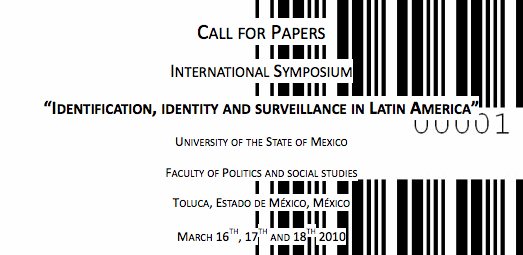Following the success of the first Surveillance Studies symposium in Brazil last year, here is the call for the next one, this time in Mexico next year.

Introduction
In modern societies, identification systems have been used as an important mechanism to govern, manage, classify and control populations; in other words, to surveil them. This has meant the employment of certain technologies (passports, national identity letters, RFID, among others), providing interconnected data base systems with information according to specific institutional protocols. In this way, we define identification as visibility and verification of specific details of people’s lives. Likewise, these identification systems have responded to various functions: security, migration control, goods and service administration, as well for territory, space and group access.
The historical, social and politic contexts shape the particular purposes to which each identification system responds. Large-scale surveillance systems to identify the population have been installed in Latin America after decades of colonial, military and single-party governments In addition they have been prompted by increasing multiculturalism in cities, Population growth, migration rates, the perceived rise in terrorism, public security and health risks, as well as the creation of public policies (to aid poverty and unemployment) and globalization.
These conditions have caused the harmonization and articulation of corporations, institutions, technologies and specific protocols for citizen identification in Latin American countries, , depending on each country or region’s particular situation, and its relationship with other regions worldwide. Nevertheless, the Latin American environment allows us to consider the construction of privacy, identities, forms of government and the possibility of resistance policies.
Paper Proposals
In line with this analytic framework, the University of the State of Mexico, Faculty of Politics and Social Studies, hereby invites scholars, analysts and activists in Latin America and worldwide, interested in identification and surveillance, in relation to such matters as cultural or ethnic identities, privacy and data protection, new identification technologies (biometrics, RFID, etc), public policies, security, communication, ethics, law, or modes of critique or resistance; to participate in the International Symposium “Identification, identity and surveillance in Latin America”, by sending a lecture proposal.
Please send an abstract, 300-500 words long, Arial 12, space line 1.5, to the following e-mail: surveillance.studies.mexico@gmail.com, before October 30th 2009. Due to the nature of this event, the abstracts and papers are to be accepted in Spanish, Portuguese and English.
Note: There is no registration fee for this event. All participants are expected to seek their own funding for travel and accommodation. A number of rooms will be reserved with reasonable rates in a nearby hotel. More details to follow.
Main subjects
1. Governmental and corporative policies of identification
2. New technologies for identification and surveillance.
3. Purposes of identification systems in Latin America.
4. Communication and information technologies.
5. Privacy and transparency.
6. Identification, identities and subjectivities.
7. Relationship between global and local, in identification systems.
8. Postcolonial logics and political regimes.
9. Identities, surveillance and resistance.
10. Identification, identity and surveillance in Latin America: new theories?
Important Dates
Call for Papers Publication: July 30th 2009.
Abstract reception deadline: October 30th 2009.
Accepted lectures list publication: December 15th 2010.
Complete paper remittance deadline: February 15th 2010.
Complete program publication: February 28th 2010.
Second Symposium on surveillance in Latin America: March 16th, 17th y 18th 2010. University of the State of Mexico, Faculty of Politics and Social Studies. Toluca, México.
Organizing Committee
Nelson Arteaga Botello
Roberto J. Fuentes Rionda
Faculty of Politics and Social Studies, University of the State of Mexico
Rodrigo Firmito
Postgraduate Program in Urban Management, Pontifical Catholic University of Parana, Curitiba, Brazil
Fernanda Bruno
Postgraduate School of Communication, Federal University of Río de Janeiro, Brasil
Marta Kanashiro
Further Studies Laboratory of Journalism and Knowledge, Technology and Market Group, University of the State of Campinas (UNICAMP), Campinas, Brasil.
Danilo Doneda
De Campos Faculty of Law, Rio de Janeiro, Brasil
André Lemos
Federal University of Bahia, Brasil
With the support of:
David Lyon
David Murakami Wood
Department of Sociology, Queen’s University, Kingston, Ontario, Canada
Proposal reception, Information and Contact
surveillance.studies.mexico@gmail.com


